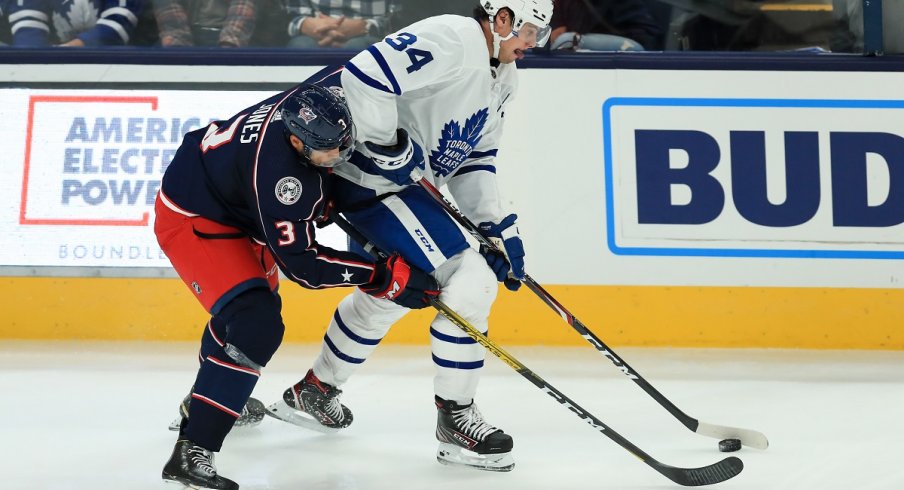The Columbus Blue Jackets and Toronto Maple Leafs are neck-and-neck in the standings, but both teams got to where they are in a strikingly different manner.
The Blue Jackets boast one of the top defensive corps in the NHL and have two starting-caliber goalies. Their head coach preaches tenacity away from the puck, discipline in the neutral and defensive zone, consistency from each of his players. Basically, they're a pain in the ass to play against.
The Maple Leafs have three all-world level offensive players, and their fourth-best forward on many nights (William Nylander) would arguably be the best forward on the Blue Jackets roster if he swapped jerseys tomorrow. They can score with the best of them (3rd in the NHL) and have the T-5th best power play in the league.
Defensively, they're so-so (aside from Morgan Reilly and Jake Muzzin, they're probably worse than that), and Frederik Andersen has been demonstrably average this season. When they're on their game, they're an elite team. Other times, well, they lose to emergency back-up goalies at home.
In Defense Of The Defense
The oldest adage in sports: defense wins championships. Playoff hockey is notoriously tight-checking, and the Blue Jackets proved last spring that a high-flying offense like the Tampa Bay Lightning can be marginalized with discipline and opportunistic scoring. Being able to roll Seth Jones-Zach Werenski and David Savard-Vladislav Gavrikov gives the Blue Jackets two impressive defense pairs. Whoever partners with Ryan Murray (Dean Kukan? Markus Nutivaara?) will form a formidable third-pairing, if he can stay healthy.
In net, both options of Joonas Korpisalo and Elvis Merzlikins are solid, and the coaching staff will have a difficult decision to make over who gets the first nod. It's not the end-all, be-all of a stat, but both have a higher all-situations save percentage (Merzlikins-.923, Korpisalo .911) than Andersen (.909) this season.
In Support Of The Offense
As stout as the Blue Jackets are defensively, one mismatch they'll have to be aware of is their center (or high forward/F3 in transition). Last year, they were able to stifle the Lightning, but Matt Duchene has since left town. Between Auston Matthews and John Tavares, the Maple Leafs have two of the top centermen in the world. Matthews finished third in the NHL in goals this season (47), one behind David Pastrnak and Alexander Ovechkin. Giving either of these players time and space could lead to a long (er, short?) series for the Blue Jackets.
Mitch Marner, who had 51 assists in 59 games this season, thrives in transition as much as any player in the league. The "big three", as they're dubbed in Toronto, can wreak havoc on teams when given even a slight opportunity. But as mentioned, they have more than just that. Nylander had 31 goals this season. In the games before the pause, he played primarily with Matthews and Zach Hyman, who was on his way to a career year with 21-16-37 in 51 games. Their second line, with Tavares, Marner, and Kasperi Kapanen, give the Maple Leafs one of the best top-sixes in the league.
Even their blue line is chock-full with gifted offensive players. Reilly struggled offensively this season but had 20 goals a season ago. Tyson Barrie started slowly in his debut season in Toronto but can spark instant offense.
What's interesting about Toronto is that they really lean into their offensive game, as opposed to hedging with a more traditional, defensive style of play. Their thought process goes, simply: hey, we have all of this offensive talent, let's see if they can stop us. Does it, at times, come at the expense of their defensive structure? One could argue yes.
Final Thought
The Blue Jackets proved last spring that there is a blueprint to defeat offensively-gifted teams like the Maple Leafs in the playoffs. Sticking with a similar game-plan is obvious (Toronto will be looking at that tape), but the key will be in successfully implementing and sustaining an aggressive but disciplined forecheck.
That should allow the Blue Jackets to limit the offensive chances while frustrating the patience of the more creatively-licensed Maple Leafs.
Still, to say that the Blue Jackets could replicate what they did to the Lightning would be pollyannish. So much of hockey is predicated on obtaining (not all that difficult) - and keeping (incredibly difficult) momentum. If the Blue Jackets find themselves trailing early in any of the playoff games, the Maple Leafs have the horses to force the Blue Jackets into a brand of hockey that likely won't behoove them.
